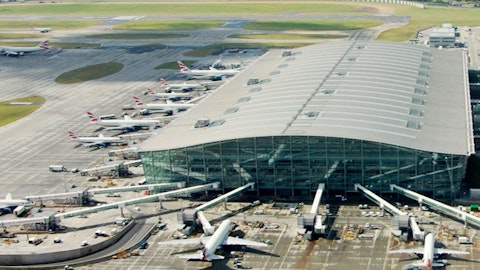Grupo Aeroportuario del Sureste, S. A. B. de C. V. (NYSE:ASR) Q3 2023 Earnings Call Transcript October 24, 2023
Operator: Good day, ladies and gentlemen, and welcome to ASUR’s Third Quarter 2023 Results Conference Call. My name is Ryan, and I will be your operator. At this time, all participants are in listen-only mode. We will conduct a question-and-answer session towards the end of today’s conference. [Operator Instructions] As a reminder, today’s call is being recorded. I’d now turn the call over to Mr. Adolfo Castro, Chief Executive Officer. Please go ahead, sir.
Adolfo Castro: Thank you, Ryan, and good morning, everyone. Before I begin discussing our results, let me remind you that certain statements made during this call may constitute forward-looking statements, which are based on current management expectations and beliefs and are subject to several risk and uncertainties that could cause actual results to differ materially, including factors that may be beyond our company’s control. As usual, additional details about our quarterly results can be found in our press release, which was issued yesterday after market close and is available on our website Investor Relations section. Following my presentation, I will be available for Q&A. Before getting into a discussion of the quarterly results, let me start today’s call with a recap of the recent development in connection with the concession agreements of our Mexican operations as recently announced.
On October 4, ASUR received a notification from the Mexican Federal Civil Aviation Agency that it has decided to amend with immediate effect the terms of the Tariff Base Regulation. These terms were laid out in the Exhibit 7 of the concession agreements established in 1998 and then amended in 1999. On October 19, as we received a notification from the Mexican Federal Civil Aviation Agency, which modified the document received on October 4. The full text of the amended Exhibit 7 was filed with the Mexican Bolsa and the Securities and Exchange Commission. On October 18, the lower house of the Mexican Congress approved the initiative to increase the concession fee from 5% to 9%, which is now under review by the Senate. We do not know when this may be approved and when the change in the case will be effective.
ASUR is currently evaluating the charges — the changes implemented by the Mexican Federal Civil Aviation Agency and the potential impact that it may have on its business, including its finances. Now, moving on to ASUR’s operating and financial performance for the quarter. Before starting, note that all comparisons are year-on-year, unless otherwise noted. Starting with traffic. On a consolidated basis, 17.6 million passengers traveled through our airports in the third quarter, a record high for a third quarter. We accomplished these even as the growth rate was low to 3.4%. Additional traffic trends by country were mixed. As in the prior quarter, the suspension of two Colombian airlines earlier in the year together with increase in the value-added taxes resulted in a contraction of nearly 15% in total traffic in Colombia.
By contrast, Puerto Rico, again, delivered the fastest growth of nearly 25% driven by solid performance in both domestic and international traffic. Lastly, traffic in Mexico was up close to 6%, driven by domestic traffic that offset a 0.6% decline in international traffic. It was primarily due to slight year-over-year decrease in the passenger traffic to and from Europe, South America, offset by higher traffic from the U.S. and Canada. Moving into the P&L, as a reminder, all reference to revenue and cost exclude construction and cost revenues. Also note that Puerto Rico and Colombia figures reflect the strong Mexican peso, which appreciated over 13% and 3% versus the U.S. dollar and the Colombian peso since the end of the third quarter 2022 through the end of the third quarter of this year, respectively.
With these, revenues increased over 3% to just over MXN6 billion in the third water, mainly driven by growth in aeronautical and non-aeronautical revenues in Mexico, while Puerto Rico and Colombia posted declines of nearly 1% and 16%, respectively. However, measuring local currencies, revenues increased 18.6% in Puerto Rico and 3.4% in Colombia. Overall, Mexico represented 73% of total revenues, while Puerto Rico and Colombia accounted for nearly 16% and 11%, respectively. Commercial revenues were up 3%, in line with passenger traffic growth, driven by increases of 2% in Mexico, 8% in Puerto Rico, partially offset by a 1% decline in Colombia. On a per passenger basis, commercial revenue remained flat at MXN116.5, with Mexico and Puerto Rico contracting to MXN136 and MXN139 per passenger, respectively, while Colombia posted a mid-term increase to MXN43.
In local currency, Puerto Rico and Colombia posted increases in commercial revenue per passenger, approximately 2.5% and 27.3%, respectively. These increases were partially driven by actions we have undertaken to further engage our passenger traffic experience. This includes 66 new commercial spaces opened across all our airport networks during the last 12 months. Of these, 16% opened in Mexico, 4% in Puerto Rico, and 46% in Colombia. Consolidated EBITDA for the quarter increased year-over-year 3% to MXN4.2 billion. In Mexico, remaining the main contributor to profitability, posting a 3% increase to MXN3.3 billion, followed a recovery in Puerto Rico with EBITDA up 8% to just over MXN500 million. Performance in Colombia also improved with EBITDA of MXN411 million.
Although this represented a decline of nearly 10%, it was better than the 20% decrease reported in the second quarter ’23. In turn, consolidated adjusted EBITDA margin, which excludes construction, remained relatively flat at 69.6% year-over-year. A strong performance in Puerto Rico, which delivered at 400 basis points margin increase, offset declines of 90 and 300 basis points in Mexico and Colombia, respectively. In summary, we delivered another good quarter despite the strong peso. Good results in Mexico were further supported by a strong performance in Puerto Rico and improving profitability in Colombia, reflecting the suspension of operations of two Colombian airlines earlier in the year and higher value-added taxes. We maintained a strong and healthy balance sheet, with cash and cash equivalents over MXN16.9 billion and a healthy debt profile.
Our strong financial position enables to return cash to shareholders in the form of dividends. Specifically, in May, we paid an ordinary dividend that amounted of nearly MXN3 billion, and in November, we will be paying an extraordinary cash dividend of MXN10 per share, equivalent to approximately another MXN3 billion. Finally, capital expenditures in the quarter totaled MXN367 million. Of this, 64% was allocated to Mexico, 35% to Puerto Rico, and the remainder in Colombia. This ends my presentation. Ryan, please open the floor for questions.
See also 11 Best Stocks to Buy in Falling Markets According to Hedge Funds and 12 Best Artificial Intelligence (AI) Stocks To Buy According to Hedge Funds.
Q&A Session
Follow Grupo Aeroportuario Del Sur S A (NYSE:ASR)
Follow Grupo Aeroportuario Del Sur S A (NYSE:ASR)
Receive real-time insider trading and news alerts
Operator: Thank you. [Operator Instructions] Our first question comes from Juan Ponce with Bradesco BBI. Please go ahead.
Juan Ponce: Hi, Adolfo. Good morning. Good morning, everybody. Thank you for taking my question. Considering that the MDP negotiation is a long process and the fact that you are now in the last stretch of the tariff negotiation, what are the implications from the regulatory changes on your MDP negotiating process? That’s my first question. And my second question would be, do you agree that perhaps the initial tariff impact be around 10%, which is what some members of the SICT have mentioned? And if the impact — if the financial impact is unknown or if we get an even greater negative impact, are there any legal avenues you can take to curtail these measures? Thank you very, very much.
Adolfo Castro: Hey, Juan, good morning. In the case of the MDP process, as we have mentioned, this is almost two years process. We were almost at the end of the process and now with this document, we will have to restart again in terms of the document that we will have to present to authorities in the coming days, I would say. As we speak, we are adjusting the document in accordance with the new regulation that we have received last week. So, we are now in the process to evaluate what the impacts may be on this respect. In terms of what you’re saying of the 10% tariff reduction, et cetera, it’s not something that we are, for the moment, available to answer. We will have to see and wait until these new bases of regulations are applied in the numbers of the company.
And that I believe is going to be at — towards the end of the year, probably the first week of January, when we are going to be able to say what was the implication of these new base tax regulations on the numbers of the company.
Juan Ponce: Okay, thank you very much, Adolfo. And regarding the — any legal avenues you can take to curtail these measures, is there a possibility or not at all, not in the cards? Thank you.
Adolfo Castro: For the moment, we are not considering any legal action on this respect.
Juan Ponce: Got it. Thank you very much, Adolfo.
Operator: Thank you. Our next question comes from the line of Guilherme Mendes with JPMorgan. Please go ahead.
Guilherme Mendes: Good morning, Adolfo, and thanks for taking my question. I have a follow up on the MDP and the regulatory changes which is related to the concession fees. On the old contract, there used to be a compensation on tariffs regarding any potential increase in concession fees. Just wondering, how should we think about this going forward so this increase from 9 — 5% to 9% on the concession fees should be fully incorporated by companies, or there may be some kind of compensation on the new contract? And the second question is regarding to the investment on the Dominican Republic. If there is any update on that front? If you could share any details in terms of timing or potentially the financials of the project? Thank you.
Adolfo Castro: Hi, good morning. In the case of the 5% to 9%, as I have mentioned during the initial remarks, this has not been approved yet. On the first place, it’s subject to Senate approval. And second, we can know when this is going to be applicable or as from when in the case Senate approves. So, in that sense, we don’t know yet how the new document or the new types of regulations are going to treat these charts. In the case of your second question, could you repeat that again?
Guilherme Mendes: Yeah, sure. It’s regarding the investment on the Dominican Republic that you announced on the previous quarter. If there’s any update on this project? Or if you could share something in terms of timing or the financials of the investment? Thank you.
Adolfo Castro: Yes, we are in the process today, as we speak, finalizing the design of the buildings. And we believe that we will initiate construction in the first half of next year.





